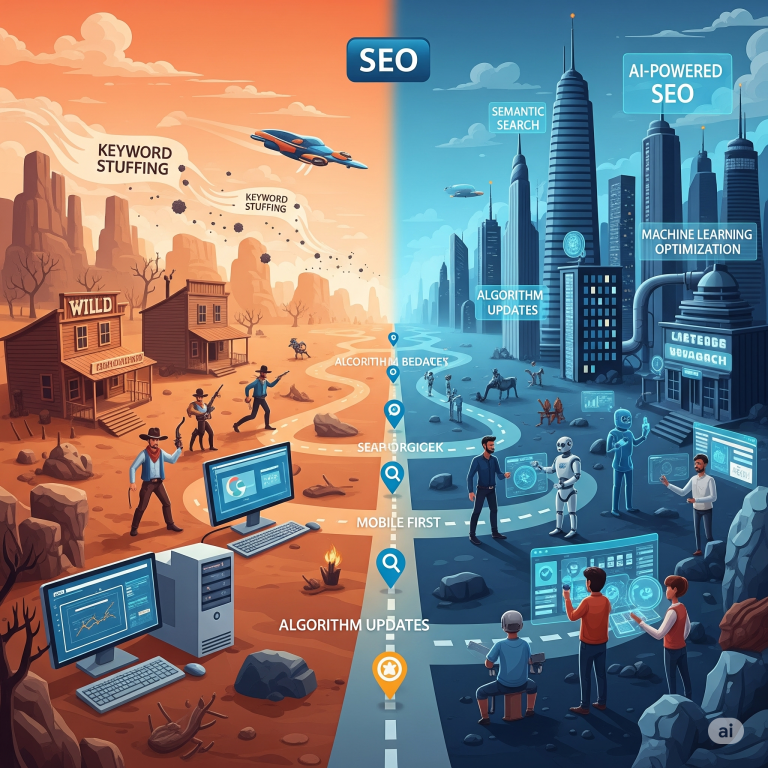A Journey Through the Evolution of SEO

Ever wonder how the internet became the organized (well, mostly organized) place it is today? A huge part of that is thanks to Search Engine Optimization, or SEO. It might sound technical, but at its heart, SEO is all about making sure your awesome website gets seen by the people who are looking for it.
But it wasn’t always this way. Let’s take a trip through the history of SEO!
The Wild West of the Web (Early to Mid-1990s)
Imagine the internet as a brand new, sprawling frontier. Early search engines like AltaVista, Yahoo!, and Excite were trying to make sense of the rapidly growing number of websites. Back then, SEO was pretty rudimentary. Think of it as shouting from the digital rooftops.
What mattered most?
- Keywords: Slapping a bunch of relevant (and sometimes irrelevant!) keywords directly into your website’s content and meta tags was the name of the game. The more you stuffed, the better your chances of ranking… or so people thought.
- Meta Tags: These little snippets of HTML code that describe your page were heavily relied upon by search engines to understand what your content was about.
It was a bit like the Wild West – easy to game the system, and quality often took a backseat to sheer volume of keywords.
The Dawn of Algorithms (Late 1990s – Early 2000s)
Then came Google, in 1998. They had a different approach, one that focused on the quality and relevance of websites. Their PageRank algorithm looked at the number and quality of links pointing to a website, essentially seeing them as votes of confidence. This marked a significant shift in SEO.
What became more important?
- Link Building: Suddenly, getting other reputable websites to link to yours became crucial. It was like getting endorsements in the real world.
- Content Relevance: While keywords still mattered, simply stuffing them wasn’t enough. Your content actually had to be relevant to what people were searching for.
What became less important?
- Keyword Stuffing: Search engines got smarter and started penalizing websites that overused keywords.
This era saw the rise of more sophisticated SEO techniques focused on providing value to users.
The User Experience Revolution (Mid-2000s – Early 2010s)
As search engines continued to evolve, they started paying more attention to the user experience. Factors like website speed, mobile-friendliness, and the quality of content became increasingly important. Algorithms like Panda and Penguin aimed to weed out low-quality content and manipulative link schemes.
What became more important?
- High-Quality Content: Creating informative, engaging, and well-written content became paramount.
- User Experience (UX): Factors like website speed, navigation, and mobile responsiveness started influencing rankings.
- Social Signals: While not a direct ranking factor, social media engagement started to play a role in discoverability and brand building.
What became less important?
- Spammy Link Building: Tactics like buying links or participating in link farms became highly risky.
SEO became less about tricking search engines and more about creating a great experience for actual human visitors.
The Age of AI and Personalization (Present and Future)
Today, we’re in an era driven by artificial intelligence and personalization. Google’s RankBrain and other AI-powered algorithms are constantly learning and adapting. Search results are becoming increasingly tailored to individual users based on their location, search history, and other factors.
What’s more important now?
- E-A-T (Expertise, Authoritativeness, Trustworthiness): Demonstrating expertise in your niche, building authority, and establishing trust are crucial, especially for “Your Money or Your Life” (YMYL) topics.
- User Intent: Understanding why people are searching for something is key to creating content that truly satisfies their needs.
- Mobile-First Indexing: With the majority of searches happening on mobile devices, having a mobile-friendly website is no longer optional – it’s essential.
- Voice Search and Natural Language Processing: As voice assistants become more popular, optimizing for natural language queries is gaining importance.
What might become even more important?
- Personalized Search Experiences: Expect search results to become even more tailored to individual users.
- Visual and Voice Search Optimization: Optimizing for images, videos, and voice queries will be crucial.
- AI-Driven Content Creation and Analysis: AI will likely play a bigger role in both creating and analyzing content for SEO.
What might become less important?
- Exact Match Keyword Targeting: While keywords still matter, focusing solely on exact matches might become less effective as search engines get better at understanding the intent behind searches.
Ready to Make It All Work?
The world of SEO is constantly evolving, but the core principles remain the same: understand your audience, create valuable content, and provide a great user experience. It can feel overwhelming, but that’s where we come in!
At MakeItAllWork we’re passionate about helping businesses like yours navigate the ever-changing landscape of SEO and achieve their online goals. Whether you’re just starting out or looking to take your SEO strategy to the next level, we’ve got the expertise and tools to help you succeed.
Visit us today at MakeItAllWork to learn more and let’s make your online presence truly shine!

 ALL BLOGS
ALL BLOGS


